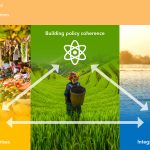Agrifood systems are under extraordinary stress. Conflict, extreme weather, climate-related disasters, economic shocks, and widening inequality are exerting mounting pressure on farmland, water resources, and the biodiversity that sustains life (FAO, 2025). Fragile supply chains only deepen these strains, with disruptions rippling through households, markets, and farms globally. These converging crises make the 2025 World […]
Launch of the Nigeria National Policies and Strategies (NPS) Seminar Series
See the event proceedings page. On 23 June 2022, the Nigeria Inception Workshop of the CGIAR National Policies and Strategies for Food, Land and Water Systems Transformation (NPS) Initiative[1], took place in Abuja. The workshop, following the initiative’s global launch in May 2022 in Kenya, introduced NPS’ work in Nigeria, launched the Nigeria NPS Seminar […]
FtF Project strengthening Nigeria’s agricultural sector through capacity-building
The Nigeria Strategy Support Program of the International Food Policy Research Institute (IFPRI-NSSP) delivered 16 trainings to close to 400 persons between 25 March and 30 April 2019 in Benue, Cross River, Delta, Ebonyi, Kaduna, Kebbi, Niger and Oyo states and Nigeria’s Federal Capital Territory (FCT). The trainings, covered a wide range of areas, including […]
Shaping Policy Discussions on Urbanization, Child Nutrition and Public Health in Nigeria: Seminars delivered in Cross River and Ebonyi states
In two research seminars held in Cross River (21 January 2019) and Ebonyi states (23 January 2019), the International Food Policy Research Institute (IFPRI) on behalf of the FtF Nigeria Agricultural Policy Project engaged 212 researchers and policy analysts, including key government officials (116 male, 96 female) on issues related to policies around child nutrition […]
New NSSP Publications on Agricultural Mechanization in Nigeria
The NSSP Office is pleased to announce some new publications on agricultural mechanization in Nigeria. NSSP Working Paper No. 53 entitled “Effects of agricultural mechanization on economies of scope in crop production in Nigeria”, co-authored by H. Takeshima, P. Hatzenbuehler and H. Edeh (see link here to download the paper), and the NSSP Policy Note […]
- 1
- 2
- 3
- …
- 6
- Next Page »


